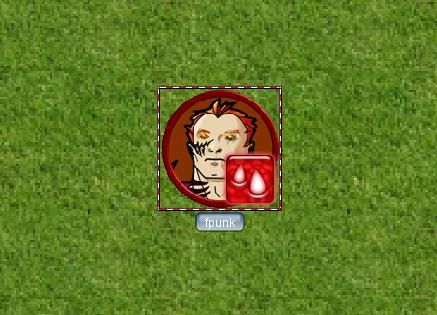Token State: Difference between revisions
No edit summary |
No edit summary |
||
| Line 1: | Line 1: | ||
A ''token state'' is a binary (''i.e.'', it has two possible values, 1 or 0) condition that is set for a given [[Token:token | token]]. States are frequently used for conditions or statuses that affect a particular character in a game (for example "Bloodied" or "Fatigued" or "Fighting Defensively") and frequently have images associated with them that are displayed to players and the GM. However, they can be used for any application in which a binary state would be useful. | A ''token state'' is a binary (''i.e.'', it has two possible values, 1 or 0) condition that is set for a given [[Token:token | token]]. States are frequently used for conditions or statuses that affect a particular character in a game (for example "Bloodied" or "Fatigued" or "Fighting Defensively") and frequently have images associated with them that are displayed to players and the GM. However, they can be used for any application in which a binary state would be useful. | ||
The image below shows a token state with an associated image applied to the token. In this case, the state name was configured by the individual creating the campaign to be called "Bloodied" and to have the associated image overlay (the state image is courtesy of the RPTools forum member AidyBaby). | |||
[[Image:State-example.jpg]] | |||
==Setting Up Token States== | ==Setting Up Token States== | ||
| Line 18: | Line 22: | ||
</source> | </source> | ||
Will return 0 if ''state.Bloodied'' is off (in other words, the token | Will return 0 if ''state.Bloodied'' is off (in other words, the token does ''not'' currently have the state called "Bloodied" set), and 1 if ''state.Bloodied'' is on. | ||
==Setting Token States with Macros== | ==Setting Token States with Macros== | ||
| Line 38: | Line 42: | ||
This statement evaluates the condition within the if() statement, and if true, assigns the value 1 to ''state.Dead''. If the condition ''HP >= 0'' is false, on the other hand, the value 0 is assigned to ''state.Dead''. | This statement evaluates the condition within the if() statement, and if true, assigns the value 1 to ''state.Dead''. If the condition ''HP >= 0'' is false, on the other hand, the value 0 is assigned to ''state.Dead''. | ||
Finally, if an image overlay is associated with the state called "Dead", it will appear if ''state.Dead'' equals 1, and disappear if ''state.Dead'' equals 0. | |||
Revision as of 17:53, 23 December 2008
A token state is a binary (i.e., it has two possible values, 1 or 0) condition that is set for a given token. States are frequently used for conditions or statuses that affect a particular character in a game (for example "Bloodied" or "Fatigued" or "Fighting Defensively") and frequently have images associated with them that are displayed to players and the GM. However, they can be used for any application in which a binary state would be useful.
The image below shows a token state with an associated image applied to the token. In this case, the state name was configured by the individual creating the campaign to be called "Bloodied" and to have the associated image overlay (the state image is courtesy of the RPTools forum member AidyBaby).
Setting Up Token States
States are configured by the user and are specific to a given campaign. States are configured via the Campaign Properties window, under the States tab. See Configuring States for details on setting up states for your campaign.
Getting Token States with Macros
States are special variables that can be referenced by macros using the general format state.statename where statename is the name configured by the user for a given state.
Examples
States can be retrieved programmatically.
[h:isBloodied=state.Bloodied]
[isBloodied]Will return 0 if state.Bloodied is off (in other words, the token does not currently have the state called "Bloodied" set), and 1 if state.Bloodied is on.
Setting Token States with Macros
States can also be set programmatically, by assigning a value of 1 or 0 to the token state.
Examples
Suppose we want to check to see if a token is "dead" and if so, set the "Dead" state on that token. We are assuming two things:
- "Death" occurs if the token's hit points (HP) have been reduced to 0 or below; and
- A state called "Dead" has been configured in the Campaign Properties.
To check for "death" and, if required, set the appropriate state, we write the following simple macro:
[h:state.Dead=if(HP <= 0, 1, 0)]This statement evaluates the condition within the if() statement, and if true, assigns the value 1 to state.Dead. If the condition HP >= 0 is false, on the other hand, the value 0 is assigned to state.Dead.
Finally, if an image overlay is associated with the state called "Dead", it will appear if state.Dead equals 1, and disappear if state.Dead equals 0.
